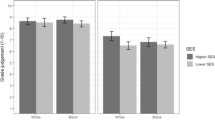Abstract
This paper studies the effect of teacher expectations on essay grades in an experimental setting. For this purpose, we randomly assign Turkish or German first names to a set of essays so that some teachers believe a given essay was written by a German native pupil, whereas others believe it was written by a pupil of Turkish origin. We find that the same essays obtain significantly worse grades and lower secondary school recommendations when bearing a Turkish sounding name.
Similar content being viewed by others
References
Ammermüller A (2007) Poor background or low returns? Why immigrant students in Germany perform so poorly in the Programme for International Student Assessment. Education Economics 15(2): 215–230
Anderson-Clark T, Green R, Henley T (2008) The relationship between first names and teacher expectations for achievement motivation. J Lang Soc Psychol 27(1): 94–99
Bertrand M, Mullainathan S (2004) Are Emily and Greg more employable than lakisha and Jamal? A field experiment on labour market discrimination. Am Econ Rev 94(4): 991–1013
Card D (1999) The causal effect of education on earnings. The Handbook of Labor Economics, vol~3A. Elsevier, Amsterdam
Carlsson M, Rooth DO (2007) Evidence of ethnic discrimination in the Swedisch labor market using experimental data. Labour Econ 14: 716–729
Casey T, Dustmann C (2008) Intergenerational transmission of language capital and economic outcomes. J Hum Resour 43(3): 660–687
Casteel CA (1998) Teacher-student interactions and race in integrated classrooms. J Educ Res 92(2): 115–120
Darley J, Gross P (2005) A hypothesis-confirming bias in labelling effects. Social cognition: key readings. Taylor and Francis Ltd, Ann Arbor
De Groot M (2004) Optimal statistical decisions. Wiley Classics Library, New York
Dee T (2005) A teacher like me: does race, ethnicity, or gender matter?. Am Econ Rev 95(2): 158–165
Ferguson RF (2003) Teachers’ perceptions and expectations and the black-white test score gap. Urban Educ 38(4): 460–507
Figlio D (2005) Names, expectations and the black-white test score gap. NBER Working Paper 11195
Hanna R, Linden L (2009) Measuring discrimination in education. NBER Working Paper 15057
Harari H, McDavid J (1973) Name stereotypes and teachers’ expectations. J Educ Psychol 65(2): 222–225
Harmon C, Oosterbeek H, Walker I (2003) The returns to education: microeconomics. J Econ Surv 17(2): 115–155
Hayes A, Krippendorff K (2007) Answering the call for a standard reliability measure for coding data. Commun Methods Meas 1(1): 77–89
Hofmann W, Gawronski B, Gschwendner T, Le H, Schmitt M (2005) A meta-analysis on the correlation between the implicit association test and explicit self-report measures. Personality Soc Psychol Bull 31: 1369–1385
Kaas L, Manger C (2010) Ethnic discrimination in Germany’s labour market: a field experiment. IZA Discussion Paper 4741
Kristen C (2006) Ethnische diskriminierung in der grundschule. Kölner Zeitschrift für Soziologie und Sozialpsychologie 58(1)
Lavy V (2008) Do gender stereotypes reduce girls’ or boys’ human capital outcomes? Evidence from a natural experiment. J Public Econ 92(10–11): 2083–2105
Lebrecht S, Pierce L, Tarr M, Tanaka J (2009) Perceptual other-race training reduces implicit racial bias. PLoS ONE 4(1). doi:10.1371/journal.pone.0004215
Lindahl E (2007) Comparing teachers’ assessments and national test results: evidence from Sweden. Institute for Labour Market Policy Evaluation Working Paper 24
Murnane R, Willett J, Levy F (1995) The growing importance of cognitive skills in wage determination. Review of Economics and Statistics 77(2):251–266
OECD (2006) Where immigrant students succeed: a comparative review of performance and engagement in PISA 2003, Programme for International Student Assessment edn. Organisation for Economic Cooperation and Development, Paris
Papay J, Murnane R, Willett J (2011) How performance information affects human-capital investment decisions: the impact of test-score labels on educational outcomes. NBER Working Paper 17120
Rosenthal R, Jacobson L (1968) Pygmalion in the classroom: teacher expectations and student intellectual development. Holt, Rinehart and Winston, New York
Rudman L, Ashmore R, Gary M (2001) ‘Unlearning’ automatic biases: the malleability of implicit prejudice and stereotypes. J Personality Soc Psychol 81(5): 856–868
Seraydaran L, Busse T (1981) First name stereotypes and essay grading. J Psychol 108(2): 253–257
Statistisches Bundesamt (2008–2009) Bildung und Kultur: Allgemeinbildende Schulen. Fachserie 11(1)
Tenenbaum HR, Ruck MD (2007) Are teachers’ expectations different for racial minority than for european american students? A meta-analysis. J Educ Psychol 99(2): 253–273
Van Ewijk R (2011) Same work, lower grade? Student ethnicity and teachers’ subjective assessments. Econ Educ Rev 30: 1045–1058
Wagner U, Christ O, Pettigrew T, Stellmacher J, Wolf C (2006) Prejudice and minority proportion: contact instead of threat effects. Soc Psychol Q 69(4): 380–390
Author information
Authors and Affiliations
Corresponding author
Rights and permissions
About this article
Cite this article
Sprietsma, M. Discrimination in grading: experimental evidence from primary school teachers. Empir Econ 45, 523–538 (2013). https://doi.org/10.1007/s00181-012-0609-x
Received:
Accepted:
Published:
Issue Date:
DOI: https://doi.org/10.1007/s00181-012-0609-x




